九年级英语培优
- 格式:doc
- 大小:77.00 KB
- 文档页数:5
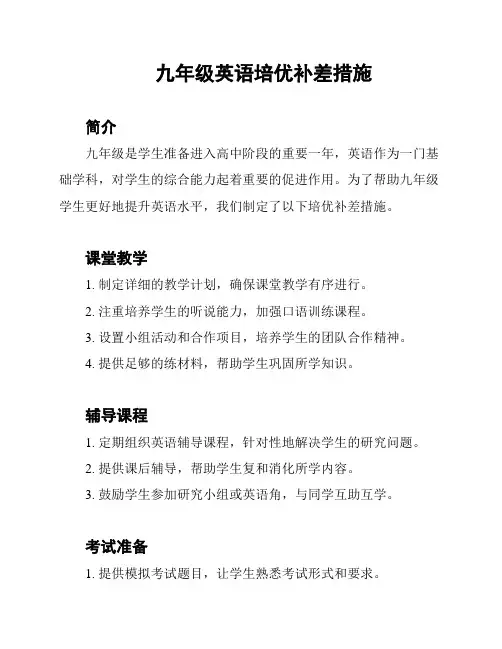
九年级英语培优补差措施
简介
九年级是学生准备进入高中阶段的重要一年,英语作为一门基础学科,对学生的综合能力起着重要的促进作用。
为了帮助九年级学生更好地提升英语水平,我们制定了以下培优补差措施。
课堂教学
1. 制定详细的教学计划,确保课堂教学有序进行。
2. 注重培养学生的听说能力,加强口语训练课程。
3. 设置小组活动和合作项目,培养学生的团队合作精神。
4. 提供足够的练材料,帮助学生巩固所学知识。
辅导课程
1. 定期组织英语辅导课程,针对性地解决学生的研究问题。
2. 提供课后辅导,帮助学生复和消化所学内容。
3. 鼓励学生参加研究小组或英语角,与同学互助互学。
考试准备
1. 提供模拟考试题目,让学生熟悉考试形式和要求。
2. 分析和解读常见考试题型,帮助学生掌握答题技巧。
3. 组织模拟考试,帮助学生熟悉考试环境和时间管理。
奖励措施
1. 设立研究奖励机制,鼓励学生积极参与研究和活动。
2. 表彰优秀学生,激发他们的自信心和研究动力。
希望通过以上培优补差措施,能够帮助九年级学生更好地提升英语水平,为顺利进入高中做好准备。
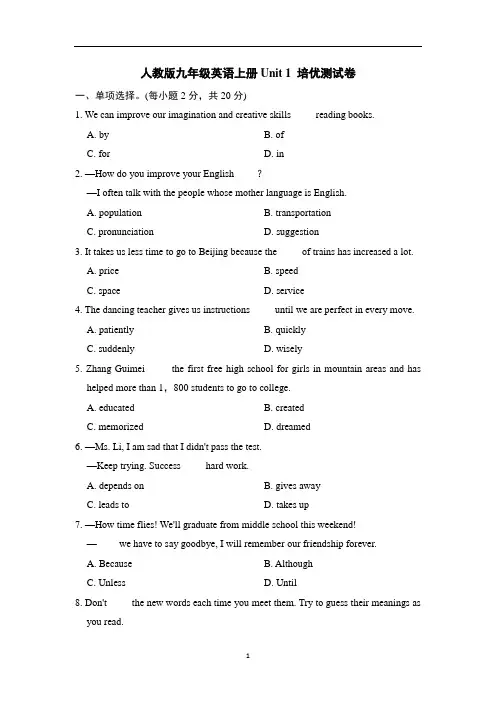
人教版九年级英语上册Unit 1 培优测试卷一、单项选择。
(每小题2分,共20分)1. We can improve our imagination and creative skills ____ reading books.A. byB. ofC. forD. in2. —How do you improve your English ____?—I often talk with the people whose mother language is English.A. populationB. transportationC. pronunciationD. suggestion3. It takes us less time to go to Beijing because the ____ of trains has increased a lot.A. priceB. speedC. spaceD. service4. The dancing teacher gives us instructions ____ until we are perfect in every move.A. patientlyB. quicklyC. suddenlyD. wisely5. Zhang Guimei ____ the first free high school for girls in mountain areas and hashelped more than 1,800 students to go to college.A. educatedB. createdC. memorizedD. dreamed6. —Ms. Li, I am sad that I didn't pass the test.—Keep trying. Success ____ hard work.A. depends onB. gives awayC. leads toD. takes up7. —How time flies! We'll graduate from middle school this weekend!—____ we have to say goodbye, I will remember our friendship forever.A. BecauseB. AlthoughC. UnlessD. Until8. Don't ____ the new words each time you meet them. Try to guess their meanings asyou read.A. look upB. look throughC. look downD. look like9. —Could you tell me the secret of improving your spoken English?—____ you speak, ____ your English will be.A. The most;the bestB. The more;the betterC. The more;the bestD. The most;the better10. —I wonder if I can learn English well. It's too difficult to learn.—____. There are no overnight success stories.A. It takes timeB. It sounds like a good ideaC. It serves you rightD. It's a piece of cake二、完形填空。
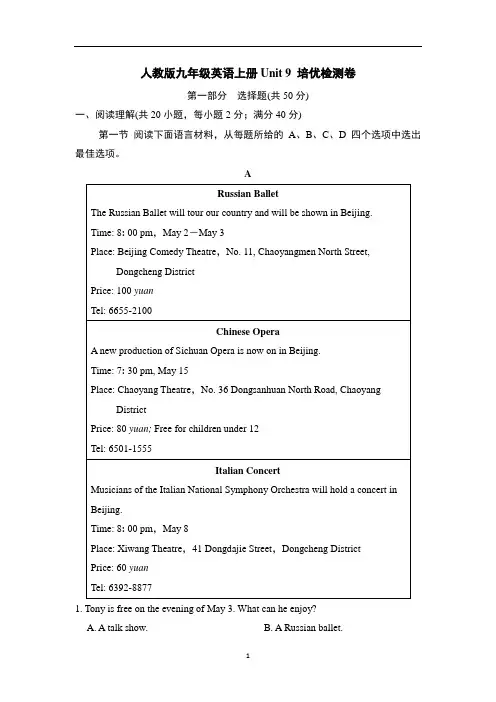
人教版九年级英语上册Unit 9 培优检测卷第一部分选择题(共50分)一、阅读理解(共20小题,每小题2分;满分40分)第一节阅读下面语言材料,从每题所给的A、B、C、D四个选项中选出最佳选项。
A1. Tony is free on the evening of May 3. What can he enjoy?A. A talk show.B. A Russian ballet.C. A Chinese opera.D. An Italian concert.2. If Mr. White goes to watch Sichuan Opera with his 8-year-old son, how muchshould he pay?A. 60 yuan.B. 80 yuan.C. 100 yuan.D. 160 yuan.3. Which number should John call if he wants to go to a concert?A. 6502-1167.B. 6655-2100.C. 6392-8877.D. 6501-1555.4. Where is the passage probably from?A. A newspaper.B. A novel.C. A report.D. A diary.BIf you are really interested in music festivals,then you must have heard of the Isle of Wight Music Festival. It takes place every June on the Isle of Wight,the UK. People think it's great to enjoy the lovely summer time on the beach.The dream begins as soon as you start traveling to the island. In order to get to the campsite(营地) of the festival,you have to take the ferry(渡轮). The ferry is full of excited festival lovers who are ready to take part in the fantastic music festival. You can put up your tent after arriving at the campsite. There people talk with each other openly. They are not that cold like those you meet in your everyday life.The festival lasts for four days. You will sponge__out all your worries about everything during the days, just like living in a dream. Then it may be hard for you to come back to “reality” after that.It seems that it is this kind of music event that makes people get together. It gives people a real sense of unity(团结). I took part in the festival with my friends last year. It was so exciting that we all lost ourselves in the beautiful music. Dancing Queen sung by Bjorn Again was my favorite. I'm really looking forward to joining in it for a second time.5. When is the Isle of Wight Music Festival?A. At the beginning of spring.B. At the beginning of summer.C. At the end of the year.D. At the end of summer.6. What does the writer think of the people at the Isle of Wight Music Festival?A. Crazy.B. Patient.C. Cold.D. Friendly.7. What do the underlined words “sponge out” in Paragraph 3 mean?A. Increase.B. Start.C. Remember.D. Forget.8. What's the passage mainly about?A. Some famous music festivals.B. A trip to an island.C. The Isle of Wight Music Festival.D. The feelings of joining in music festivals.CLulu,a Hungarian PhD(匈牙利哲学博士)student at Tsinghua University,first came to Beijing in 2017. She soon fell in love with the city. She also found her greatest hobby—Peking Opera.Lulu watched Peking Opera for t he first time in an opera museum. “I found it really fantastic,” she said. “ Both the outfits (装束) and the movements were so wonderful. The face-painting was something I'd never seen before. It is so different from Western opera. ”With great interest,she joined the Peking Opera group of Tsinghua University. That made her see that Peking Opera is much more than just the looks. “There is really,really huge cultural and historical background in Peking Opera. ”The group members practice twice a week. Mostly,they practice singing and movements. The biggest problem for Lulu was learning the Asian way of singing. “To start with,my throat was in great pain,because I was using my voice in the wrong way,” she said. But with the help of teachers,she has improved a lot.There are other international students in the group. “I really love Peking Operabecause it brings us together,” she said. “I believe that art has no boundaries(界限)and music has no language barriers(障碍). I hope to share my love for Peking Opera with mo re people outside China. ”9. When did Lulu first come to Beijing?A. In 2016.B. In 2017.C. In 2018.D. In 2019.10. When Lulu first watched Peking Opera,she found the outfits and movementswere ____.A. uglyB. strangeC. wonderfulD. old11. Why did Lulu have trouble with the way of singing at first?A. Because she didn't get enough practice.B. Because she wasn't good at singing at all.C. Because she couldn't pronounce Chinese well.D. Because she didn't use her voice in the right way.12. From this passage,what can we infer(推断)?A. Fewer Peking Opera groups will be set up in the future.B. The Asian way of singing will be harder to learn in the future.C. Lulu will introduce Peking Opera to more foreigners in the future.D. More students in Tsinghua University will learn Western opera in the future.D①On January 4th,the China National Traditional Orchestra(乐团)played some well-known traditional music in their concert. People enjoyedthe beautiful sounds of guzheng,the powerful tunes of suona,the touchingnotes of erhu and so on. Each traditional Chinese musical instrument tells itsown story.②“I've fallen in love with the sounds of traditional instruments,especially pipa,the four-stringed instrument(四弦乐器) with a history of more than 2,000 years. It can produce different sounds,such as the sounds of falling snow and rain. Everytime I listen to a pipa tune(琵琶曲调),I have a strong feeling of peace,” said Yang Tian after the concert.③However,a recent report suggests the number of traditional music listeners is dropping. To wake up people's love for traditional music,something creative has been done.④In some traditional music concerts,VR technology is used. It's like watchinga 3D movie.⑤Li Xiaobing,a music teacher from Beijing,combines traditional folk singing and operas with Chinese instruments through technology. People are surprised at his works and they love them!⑥Some musicians try to add something new to traditional music. They bring modern music like pop into traditional music. When the East meets the West,the new form of music wins the hearts of both the old and the young.⑦Traditional music shows the beauty of our culture,and with some creativity,great things happen.13. How many kinds of traditional instruments are mentioned in the passage?A. 3.B. 4.C. 5.D. 6.14. What did Li Xiaobing do to wake up people's love for traditional music?A. He told many cheerful stories.B. He made good 3D movies with VR technology.C. He mixed traditional music with Chinese instruments.D. He brought modern music like pop into traditional music.15. Which paragraphs introduce some creative methods?A. ③④⑤B. ④⑤⑥C. ⑤⑥⑦D. ④⑥⑦16. What does the writer think of traditional music according to the passage?A. Traditional music must be taught creatively.B. Traditional music and technology must be connected.C. Traditional music should only be played in concerts.D. Traditional music with creativity will be more popular.第二节阅读短文,从方框内所给的选项中选出可以填入空白处的最佳选项,其中有一个多余的选项。
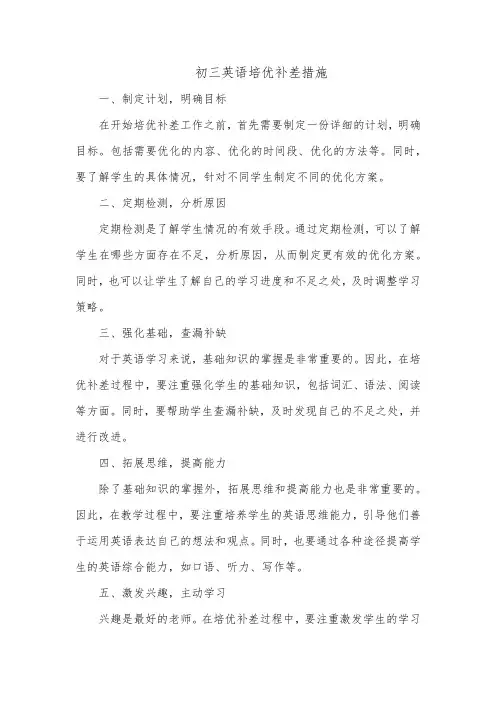
初三英语培优补差措施一、制定计划,明确目标在开始培优补差工作之前,首先需要制定一份详细的计划,明确目标。
包括需要优化的内容、优化的时间段、优化的方法等。
同时,要了解学生的具体情况,针对不同学生制定不同的优化方案。
二、定期检测,分析原因定期检测是了解学生情况的有效手段。
通过定期检测,可以了解学生在哪些方面存在不足,分析原因,从而制定更有效的优化方案。
同时,也可以让学生了解自己的学习进度和不足之处,及时调整学习策略。
三、强化基础,查漏补缺对于英语学习来说,基础知识的掌握是非常重要的。
因此,在培优补差过程中,要注重强化学生的基础知识,包括词汇、语法、阅读等方面。
同时,要帮助学生查漏补缺,及时发现自己的不足之处,并进行改进。
四、拓展思维,提高能力除了基础知识的掌握外,拓展思维和提高能力也是非常重要的。
因此,在教学过程中,要注重培养学生的英语思维能力,引导他们善于运用英语表达自己的想法和观点。
同时,也要通过各种途径提高学生的英语综合能力,如口语、听力、写作等。
五、激发兴趣,主动学习兴趣是最好的老师。
在培优补差过程中,要注重激发学生的学习兴趣,让他们感受到英语的魅力,从而更加主动地学习英语。
可以通过一些有趣的活动、游戏、歌曲等来激发学生的学习兴趣。
六、分类指导,因材施教学生之间存在差异,因此在教学过程中需要分类指导,因材施教。
对于不同层次的学生,要制定不同的教学方案和优化方案,以满足他们的学习需求和期望。
七、合作探究,共同进步合作探究是一种有效的教学方式,可以让学生在互相帮助和学习中共同进步。
因此,在教学过程中,可以组织一些合作探究活动,让学生一起解决英语学习中的问题,互相学习、互相提高。
同时也可以鼓励学生参加英语角等语言交流活动,提高他们的口语表达能力。
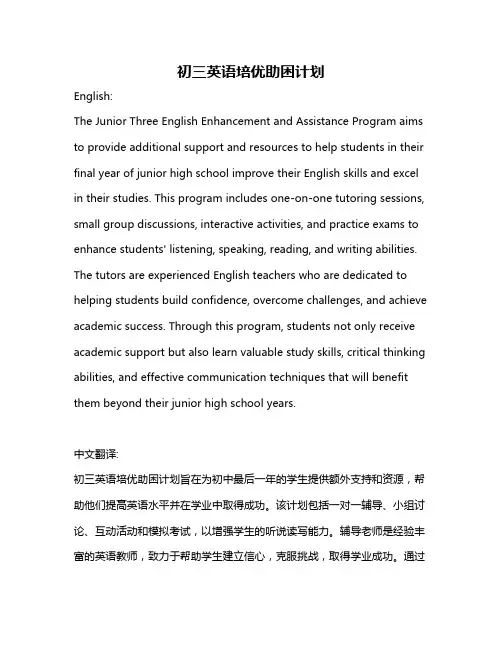
初三英语培优助困计划English:The Junior Three English Enhancement and Assistance Program aims to provide additional support and resources to help students in their final year of junior high school improve their English skills and excel in their studies. This program includes one-on-one tutoring sessions, small group discussions, interactive activities, and practice exams to enhance students' listening, speaking, reading, and writing abilities. The tutors are experienced English teachers who are dedicated to helping students build confidence, overcome challenges, and achieve academic success. Through this program, students not only receive academic support but also learn valuable study skills, critical thinking abilities, and effective communication techniques that will benefit them beyond their junior high school years.中文翻译:初三英语培优助困计划旨在为初中最后一年的学生提供额外支持和资源,帮助他们提高英语水平并在学业中取得成功。
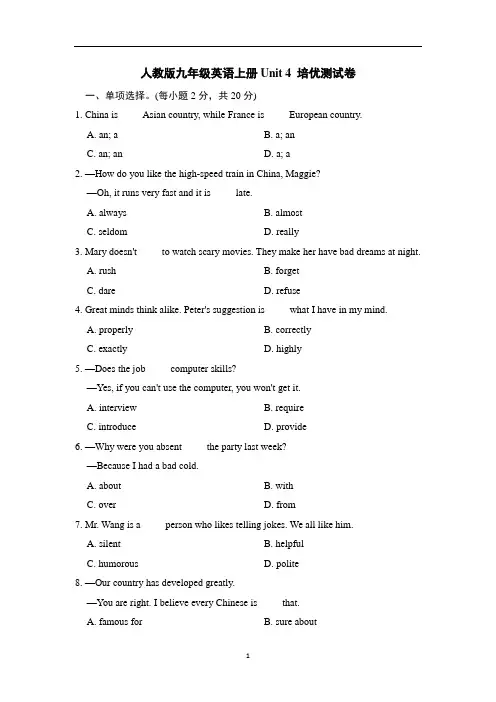
人教版九年级英语上册Unit 4 培优测试卷一、单项选择。
(每小题2分,共20分)1. China is ____ Asian country, while France is ____ European country.A. an; aB. a; anC. an; anD. a; a2. —How do you like the high-speed train in China, Maggie?—Oh, it runs very fast and it is ____ late.A. alwaysB. almostC. seldomD. really3. Mary doesn't ____ to watch scary movies. They make her have bad dreams at night.A. rushB. forgetC. dareD. refuse4. Great minds think alike. Peter's suggestion is ____ what I have in my mind.A. properlyB. correctlyC. exactlyD. highly5. —Does the job ____ computer skills?—Yes, if you can't use the computer, you won't get it.A. interviewB. requireC. introduceD. provide6. —Why were you absent ____ the party last week?—Because I had a bad cold.A. aboutB. withC. overD. from7. Mr. Wang is a ____ person who likes telling jokes. We all like him.A. silentB. helpfulC. humorousD. polite8. —Our country has developed greatly.—You are right. I believe every Chinese is ____ that.A. famous forB. sure aboutC. proud ofD. ready to9. We used to ____ to the radio every morning in the past. But now it seems thateveryone has got used to ____ on their phones.A. listening; playingB. listen; playingC. listen; playD. listening; play10. Stand up and do some exercise ____. Don't play computer games too much.A. all the timeB. at a timeC. most of the timeD. from time to time二、完形填空。
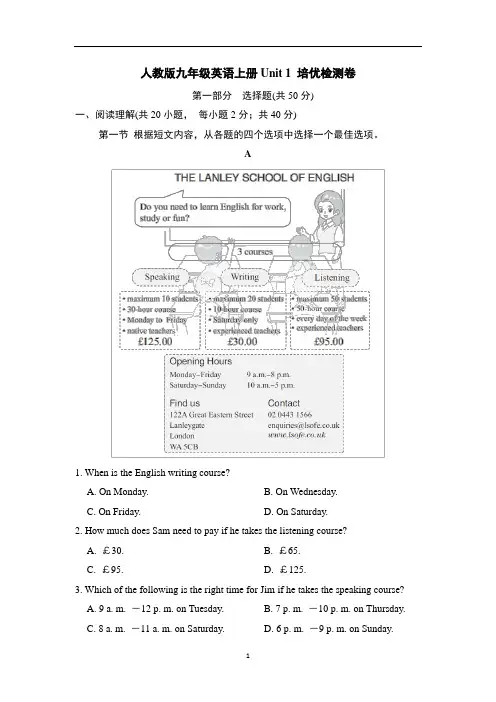
人教版九年级英语上册Unit 1 培优检测卷第一部分选择题(共50分)一、阅读理解(共20小题,每小题2分;共40分)第一节根据短文内容,从各题的四个选项中选择一个最佳选项。
A1. When is the English writing course?A. On Monday.B. On Wednesday.C. On Friday.D. On Saturday.2. How much does Sam need to pay if he takes the listening course?A. £30.B. £65.C. £95.D. £125.3. Which of the following is the right time for Jim if he takes the speaking course?A. 9 a. m. -12 p. m. on Tuesday.B. 7 p. m. -10 p. m. on Thursday.C. 8 a. m. -11 a. m. on Saturday.D. 6 p. m. -9 p. m. on Sunday.4. Where does the text probably come from?A. A website.B. A movie magazine.C. A science report.D. A travel guide.BIn my first high school year I joined my school's color guard (掌旗仪仗队) because I thought it would be fun learning to toss (抛) a flag. At first it was easy, but a couple of months later we were taught the single-and-a-half toss. We tossed our flag so that it would turn one and a half times in the air and we had to catch the pole (旗杆) straight up and down with the flag at the top. Sometimes I dropped it, and other times it went to one side when I tossed my flag. After an hour I was the only one who couldn't do it.Our teacher, Angie, asked me to keep practicing while everyone else got to relax.I felt ashamed (羞愧)as my teammates watched me fail so many times. Finally I got so tired of the toss that I didn't care whether I did it right.“Are you giving it up?” Angie asked.“Yes, I am,” I shouted at her. She sent me inside the waiting room. There I was allowed to cry out my frustration (沮丧). Then Angie came in and said, “You are trying to be too perfect. ” She told me never to give up. She left me alone and I realized Angie was right—by giving up, I was also giving up on the team and myself.I kept practicing and by the next practice I had mastered the toss.I realized that the color guard could teach me lessons about life. There were moments when I was going to fail, but the best thing I could do was learn from my mistakes.5. Why did the writer join the color guard?A. Because her best friend joined it too.B. Because she would get a stronger body.C. Because her parents wanted her to do it.D. Because she thought it would be interesting.6. How was the writer's single-and-a-half toss at first?A. Not so bad.B. Quite poor.C. Just so-so.D. Perfect.7. What did Angie encourage the writer to do?A. To be perfect.B. To stay alone.C. To keep practicing.D. To ask for help.8. What can we learn from the story?A. We can succeed by learning from mistakes.B. Joining the color guard helps make friends.C. Team spirit is the most important to a team.D. Instructors are always role models for a team.CAre there any useful ways to remember words better?Stay up late doing exercises, remembering every grammar rule and reading all English articles again and again… Are these the ways you learn English? The bad news is that the ways may do you little good. But the good news is that there are better ways to build your English vocabulary.★Learn a new English word every dayIf you're not sure where to start, try making cards of the most commonly used words. Another way is reading. If you like reading about travel, pets or food, read about these topics in English. Read a few articles each morning, and circle new words. If you like watching movies, pick one and start watching. If you're afraid you won't understand everything, you can always watch them with subtitles. Once you're confident in your English listening skills, try watching movies without subtitles.★Don't forget to record new words in a vocabulary notebookWhenever you come across a new word, write it down. Keep the notebook and a pen at hand. Then, you'll have something to review while traveling or taking a break. ★The vocabulary learning systemAnother thing to do is develop an organized but easy way of collecting and learning new words. For example, a card system should include the following information:*Words*English meaning of the words*Phrases or sentences*Related words*Words of similar meanings and words of opposite meanings*Chinese meaning on the back of the card★__▲__People remember facts better if they are given in logical(符合逻辑的) groups. Creating lists of words related to common themes—such as friendship, family, wealth, careers, science—will be much easier for learning and remembering words than collecting words according to their first letters.9. In Paragraph 1, the writer introduces the topic by ____.A. describing the common scenes of students' ways of learningB. listing the problems that students have when learningC. presenting a few questions that students want to askD. telling a funny story of a language learning experience10. The underlined word “subtitles” means____.A. names of books, magazines, or other published worksB. words that translate what is said in foreign films and appear at the bottom ofthe screenC. the second titles which are often longer and explain moreD. names that describe people's social positions or jobs11. Which of the following sentences is the most suitable one to be put in the__▲__?A. Understand and remember facts betterB. Collect words according to their themes or subjectsC. Remember a list of unrelated wordsD. Divide words according to their first letters12. In which order is the passage written?A. Time order.B. Space order.C. From the specific(具体) to the general(总体).D. From the general to the specific.DA tree has roots. People have roots too. If you get to the root of a problem, you will solve it. It's the same thing with words. Dig deeply into a big, unknown word and you will understand where it came from.As readers, especially those reading in a second language, we need to find information as if we were skilled detectives (侦探). When meeting a new and difficult word, we should judge the situation first. Then connect all the things we know together and see if it helps us to understand what it means.As you know, prefixes (前缀) and suffixes (后缀) can be added to the beginning or end of words to change the meaning. Know them, and you will have the word building ability. But root words are the key. Take time to learn a few of these and put them in your memory, and you will become a great word detective.Let's look at one common root word used in English. “Alter” from Latin means “other”. When you meet this root word, you know that the bigger word has something to do with “other”. Examine the word “alternate”. Can you find the Latin root in it?Learn as many root words as possible in the language you are studying. Then use your “rooting for words” skills. Like any new skill, practice and hard work always pay off.13. What does the underlined word “it” in Paragraph 2 refer to?A. The situation.B. The crime scene(犯罪现场).C. A new and difficult word.D. Everything that is known.14. If Jim and Lily often go to the movies, which one below is “alternating paying”?A. They each pay half.B. Jim pays every time.C. They take turns paying.D. Their parents pay for them.15. How does the author explain his ideas about root words?A. By giving a fact.B. By taking an example.C. By telling a story.D. By having a discussion.16. Which of the following shows the structure (结构) of the passage?(①=Paragraph 1,②=Paragraph 2,…)第二节阅读短文,从方框内所给的选项中选出可以填入空白处的最佳选项,其中有一个多余的选项。
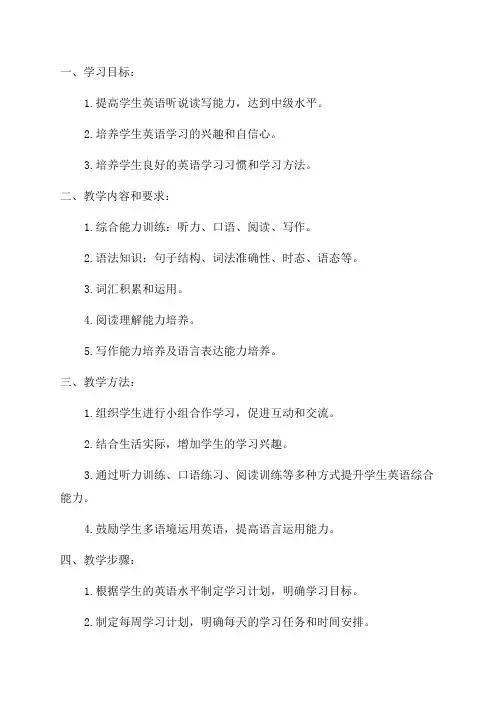
一、学习目标:1.提高学生英语听说读写能力,达到中级水平。
2.培养学生英语学习的兴趣和自信心。
3.培养学生良好的英语学习习惯和学习方法。
二、教学内容和要求:1.综合能力训练:听力、口语、阅读、写作。
2.语法知识:句子结构、词法准确性、时态、语态等。
3.词汇积累和运用。
4.阅读理解能力培养。
5.写作能力培养及语言表达能力培养。
三、教学方法:1.组织学生进行小组合作学习,促进互动和交流。
2.结合生活实际,增加学生的学习兴趣。
3.通过听力训练、口语练习、阅读训练等多种方式提升学生英语综合能力。
4.鼓励学生多语境运用英语,提高语言运用能力。
四、教学步骤:1.根据学生的英语水平制定学习计划,明确学习目标。
2.制定每周学习计划,明确每天的学习任务和时间安排。
3.根据教学大纲和学生的实际情况,选择合适的教材和教学资源。
4.统筹安排听说读写的练习,每天安排一定时间进行听力训练、口语练习、阅读训练和写作训练。
5.分组组织学生进行小组合作学习,鼓励互助互学,相互讨论和解答问题。
6.每周进行一次小测验,检查学生的学习效果。
7.每个月安排一次模拟考试,检验学生的综合能力。
五、学习资源:1.英语教科书和参考书。
2.网络资源:英语学习网站、英语学习APP等。
3.各类英语学习资料和练习册。
六、学习提示:1.制定学习计划:合理安排学习时间,合理分配各项学习任务,在每天的学习计划中安排每个学科的学习时间。
2.克服困难:遇到困难及时求助老师或同学,勇于面对挑战,不轻易放弃。
3.多做练习:进行大量的练习,巩固已学知识点,提高学习效果。
4.多参加口语练习和讨论:提高口语表达能力和听力理解能力,积极参与课堂讨论,培养自信心。
5.多听多读:通过多听多读,培养对英语的感觉,提高理解能力和语感。
6.写作训练:多进行写作训练,提高写作能力和语言表达能力。
七、复习与总结:1.每天进行学习笔记的整理和总结,复习已学知识点。
2.每周进行一次知识点的复习和巩固。
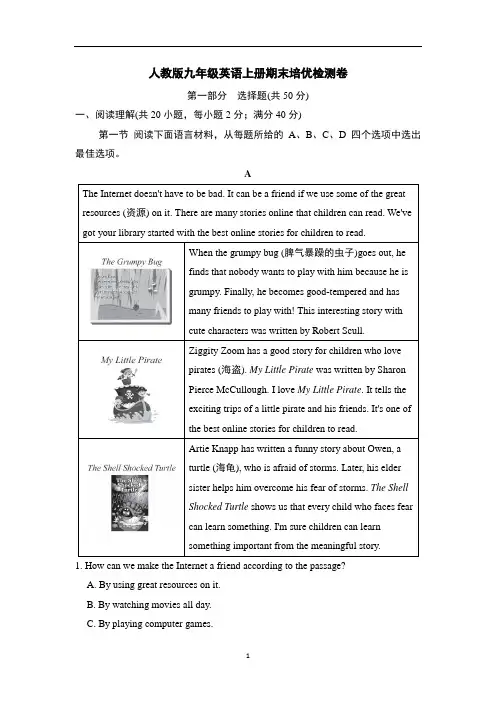
人教版九年级英语上册期末培优检测卷第一部分选择题(共50分)一、阅读理解(共20小题,每小题2分;满分40分)第一节阅读下面语言材料,从每题所给的A、B、C、D四个选项中选出最佳选项。
AThe Internet doesn't have to be bad. It can be a friend if we use some of the great resources (资源) on it. There are many stories online that children can read. We've got your library started with the best online stories for children to read.When the grumpy bug (脾气暴躁的虫子)goes out, hefinds that nobody wants to play with him because he isgrumpy. Finally, he becomes good-tempered and hasmany friends to play with! This interesting story withcute characters was written by Robert Scull.Ziggity Zoom has a good story for children who lovepirates (海盗). My Little Pirate was written by SharonPierce McCullough. I love My Little Pirate. It tells theexciting trips of a little pirate and his friends. It's one ofthe best online stories for children to read.Artie Knapp has written a funny story about Owen, aturtle (海龟), who is afraid of storms. Later, his eldersister helps him overcome his fear of storms. The ShellShocked Turtle shows us that every child who faces fearcan learn something. I'm sure children can learnsomething important from the meaningful story.1. How can we make the Internet a friend according to the passage?A. By using great resources on it.B. By watching movies all day.C. By playing computer games.D. By chatting with good friends.2. In which story can children enjoy very exciting trips?A. The Grumpy Bug.B. The Little Girl.C. The Shell Shocked Turtle.D. My Little Pirate.3. What is the turtle afraid of in the story The Shell Shocked Turtle?A. Wind.B. Rain.C. Storms.D. Clouds.4. Where can you find these stories easily according to the passage?A. In a magazine.B. On the Internet.C. In the newspaper.D. In a science book.BDad recently read me a speech, hoping to satisfy my endless search for answers—answers to everything. Ever since I was very young, I've asked countless times “What should I do?”,trying to avoid making mistakes. Maybe I feared to take my first baby step on my own I think.During my middle school years, I changed. It was when I decided to try for the lead in Beauty and the Beast without asking Dad for advice. I didn't mind that I would have to memorize lines and movements, and I would take the chance that I might fail.On the day of the audition(试镜), I kept telling myself, “If you think you can't do it the right way, just don't go. ” My heart was pounding; my hands were shaking so badly that I wasn't certain whether people would hear me.But something happened. When I opened my mouth, I found the sound was loud, powerful and sweet! And I even reached the high notes that I'd never reached! It was fantastic! I was trying bravely even though I might fail. But I didn't. That audition wasn't the end of the trap that kept me from trying, but it was definitely an important part of the process of growing.That day, I realized that if I want to live my life to the fullest, I have to push myself. Because my parents, friends and teachers don't always have the answer to “What should I do?”.Now, I do take these chances, with baby steps, every day, like voicing myopinions in class discussions, riding my horse over a threefoot jump…“Life is learning to deal with Plan B,” Dad stated (陈述) in his speech. But I now know Plan A I make for my life will become easier and easier with every chance I take.5. When the writer was young, she always asked for help because ____.A. she always liked to know more about the worldB. she was too young to understand Dad's speechesC. she always compared Plan A to Plan B before actingD. she was afraid to fail and just wanted to do things the right way6. How did the writer feel before the audition?A. Terrible.B. Calm.C. Nervous.D. Confident.7. Th e sentence “Life is learning to deal with Plan B. ” probably means “____”.A. Try to avoid mistakes in life.B. Keep searching for answers.C. Plan B is always much easier than Plan A.D. Try things bravely and never fear to make mistakes.8. What is the best title of the passage?A. Nothing is impossibleB. The process of growingC. Taking every chanceD. An unexpected auditionCParagraphica is an AI camera that was invented by Bjorn Karmann. It has no lens (镜头) to take in light and take a picture. It uses information about what your location looks like, and uses AI to create a picture that is something like what you're seeing.How does Paragraphica do it? First, it collects information about the camera's location using three different APIs. The information includes things like the time of day, the weather, the address and more. Then, it creates a paragraph that describes what the camera should be seeing according to the information. Finally, it uses a text-to-image conversion program to create a picture. When all of the information is ready, you “point and shoot” and a picture appears on the camera's screen.You might wonder, “If it can't see anything, how does AI know what a place looks like?” Actually, AI works by “learning” from information co llected and recorded by humans. It then uses the information to perform a task (任务). In the case of this camera, humans have collected billions of pieces of information on what certain weather looks like, what grassland looks like, or what a crowded street in Western Europe looks like. Paragraphica collects all the information to create a picture of a certain place at a certain moment. It's not accurate and it's not meant to be. It's just an idea of how it probably looks according to the information.Since Paragraphica is so convenient, will it take the place of traditional cameras? “Paragraphica is an art project. It won't make a product or challenge photography,” Karmann said. “I just want to call people's attention to AI's influence on our lives. ”9. What is special about Paragraphica?A. It is the first camera to use AI.B. It has a special lens to take in light.C. It can take pictures of special scenes.D. It takes pictures without seeing anything.10. What can we learn from Paragraph 2?A. What Paragraphica looks like.B. When Paragraphica was invented.C. What information Paragraphica collects.D. How soon Paragraphica can create a picture.11. The underlined word “accurate” probably means “____”.A. quite difficultB. almost readyC. exactly correctD. very convenient12. What is the writer's purpose in writing the passage?A. To introduce a new and creative app.B. To call on people to see the world in a new way.C. To show us the influence of AI technology.D. To teach us how to take amazing pictures.DWhat comes to mind when you think of archaeologists (考古学家)? Are they as cool as the characters in some movies? Let's discover the world of archaeologists.①Historical treasures are often hidden underground. To find the proper place for digging, archaeologists do surveys to search for signs of ancient sites (遗址). These signs may be things like broken pieces of ancient tools. It's hard work. They have to walk across the field in all kinds of weather. Besides, it requires much experience and professional knowledge to tell an ordinary rock from a stone tool.②Archaeologists spend a lot of time in the lab studying the discoveries. Luckily, they are now closer to answering those mysteries than ever with the help of modern technology. The first thing they need to do is to find out the age of the things discovered. They also examine bones of humans or animals to find out the cause of their death and what they ate during their lifetime.③Ancient objects can be damaged (损坏) in different ways. For example, bowls and cups are often in pieces, and metal tools are usually covered with rust. Before repairing these objects, archaeologists use X-rays to look for damage. If the rust is harmful, they need to make it disappear and repair the object with something special. In this process, they have to be very patient and careful so as not to damage the value of the object.Though the job can be physically tiring or requires working long hours in the lab, most archaeologists are proud of their work. It's their hard work that has brought the lost treasures back to life.13. The writer introduces the topic by____.A. listing factsB. asking questionsC. giving examplesD. offering ideas14. According to the passage,____helps archaeologists better answer the mysteries.A. physical healthB. perfect weatherC. modern technologyD. common knowledge15. Match the sentence with each paragraph.a. Studying the discoveries.b. Asking questions.c. Repairing and cleaning.d. Finding places.A. ①-a; ②-b; ③-cB. ①-d; ②-a; ③-bC. ①-b; ②-a; ③-cD. ①-d; ②-a; ③-c16. The structure of the passage is ____.(①=Paragraph 1,②=Paragraph 2,…)第二节阅读短文,从方框内所给的选项中选出可以填入空白处的最佳选项,其中有一个多余的选项。
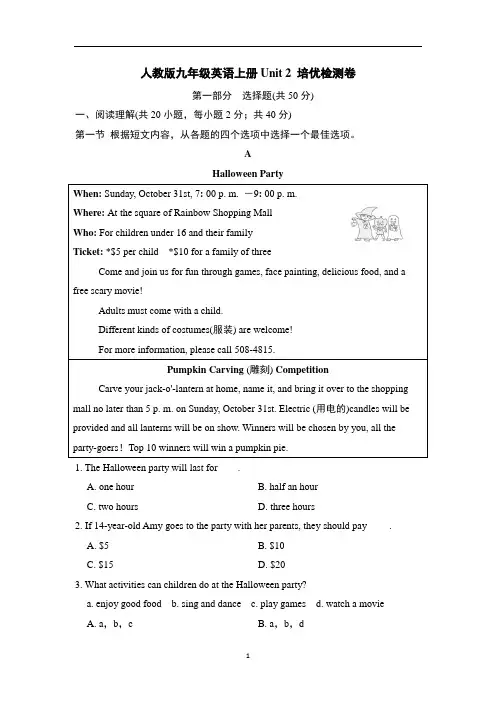
人教版九年级英语上册Unit 2 培优检测卷第一部分选择题(共50分)一、阅读理解(共20小题,每小题2分;共40分)第一节根据短文内容,从各题的四个选项中选择一个最佳选项。
AHalloween PartyCome and join us for fun through games, face painting, delicious food, and a1. The Halloween party will last for____.A. one hourB. half an hourC. two hoursD. three hours2. If 14-year-old Amy goes to the party with her parents, they should pay ____.A. $5B. $10C. $15D. $203. What activities can children do at the Halloween party?a. enjoy good foodb. sing and dancec. play gamesd. watch a movieA. a,b,cB. a,b,dC. a,c,dD. b,c,d4. What can we learn from the passage?A. Only teenagers are welcome to the party.B. You can get more information either by calling or online.C. You can make lanterns at the party.D. There will be ten winners at the Pumpkin Carving Competition.BHave you ever seen lions dancing in the streets? The lions dance to the beat of a drum. Of course, they are not real lions. They are dancers in lion costumes(服饰). Lion dancing first started in China centuries ago. It is meant to bring good luck in the coming year.Usually, a lion is made up of two dancers. One dancer controls the head. The other controls the tail.“I think of it as a sport,” says Anthony Huang, aged 16. He is a member of the New York Chinese Freemasons Athletic Club. Anthony performs as the lion's head. It can weigh 20 pounds. Lion dancing is important to Anthony. “This tradition really lifts me up,” he says.In the past, lion dancing was performed mostly by men. But it is different today. LionDanceMe is a lion dancing group in San Francisco, California. There are boys and girls on its team. They dance together.“Anyone can take up lion dancing. You have to believe that you can do it,” says Ananda Tang-Lee, a 17-year-old girl.Lion dancing will continue to evolve(演变). But a team's sense of community will never change. “We ca ll it a family,” Ananda says. “It's really great, because we always have each other's backs. ”5. Why do people perform lion dancing?A. To sell lion-dancing costumes.B. To wish for a lucky new year.C. To protect the lions in the wild.D. To show skills of playing the drum.6. Which role does Anthony play in lion dancing?A. The lion's head.B. The lion's tail.C. The drummer.D. The dresser.7. What can we infer from Ananda's words “We call it a family”?A. They bring happiness to the family.B. They call lion dancing a family game.C. They live together in a big family.D. They support each other like a family.8. Which of the following is TRUE?A. Lion dancing is performed by the real lions.B. Lion dancing started recently.C. Anthony regards lion dancing as a kind of sport.D. Not everyone can take part in lion dancing.CYou may have known about many traditional Chinese festivals such as the Spring Festival or the Lantern Festival, but have you ever heard of Dragon Head-Raising Day?Dragon Head-Raising Day is also called the Spring Dragon Festival. It is on the second day of the second lunar (农历) month. It's on March 11 this year. It came from an old story. After that day, the Dragon King will bring more rain. So that day is the start of the farming season.One of the most interesting things related to the day is about the haircut. People believe that a haircut during the first lunar month is not a good idea. It may bring bad things to your uncles. So people can only have their hair cut on or after Dragon Head-Raising Day. Although it's not true, many people still do it.There are also other ways to celebrate this festival. For example, people eat food with dragon names. People call noodles the dragon's beard (胡须). Dumplings are the dragon's ears and spring rolls (春卷) are the dragon's scales (鳞).People also perform dragon dancing and make dragon lanterns. The lanterns stand for people's best wishes and good luck.9. When is Dragon Head-Raising Day?A. On the second day of February.B. On the second day of the second lunar month.C. On March 11 every year.D. On the first day of the second lunar month.10. Which is one of the most interesting things about Dragon Head-Raising Dayaccording to the writer?A. The custom about the haircut.B. The farming season.C. Food with dragon names.D. Dragon dancing.11. Which is NOT true according to the passage?A. Dragon Head-Raising Day is also called the Spring Dragon Festival.B. After Dragon Head-Raising Day, there will be more rain.C. A haircut will bring good things to uncles during the first lunar month.D. People eat food with dragon names to celebrate the festival.12. The purpose of the passage is ____.A. to ask students to cut their hairB. to introduce Dragon Head-Raising DayC. to ask people to do the farm workD. to teach people how to celebrate the festivalD①There are 56 ethnic (民族的) groups in China. Different ethnic groups have their own special cultures. Let's enjoy some of them.②The Bai people use a very old way, tie-dye (扎染), to dye clothes. Tie-dye hasa history of about 1,500 years. During the Tang and Song dynasties, people chose tie-dyed clothes as gifts.③The Mongolian people live in the Mongolian yurts (蒙古包). These yurts are large round tents and their tops look like umbrellas. They are the traditional homes of the Mongolian people. The yurts are usually white because they're made of sheep's wool(羊毛). And white is a symbol of happiness.④The Zhuang people like singing even more than talking. On the third day of the third Chinese lunar month, they hold a big singing festival. It is thrilling and wonderful. Men and women singers sing in pairs. The winners are the “king” and “queen” of singing.⑤The Miao people have a special festival, the Manggao Festival. It's in the first Chinese lunar month every year. The Miao people regard Manggao as a hero who helped to protect their homes. At the festival, young men dress up like Manggao and touch others to send good wishes.13. Who uses tie-dye to dye clothes most?A. The Bai people.B. The Mongolian people.C. The Miao people.D. The Zhuang people.14. What does the underlined word “thrilling” mean in Paragraph 4?A. Quiet.B. Slow.C. Exciting.D. Easy.15. How do people celebrate the Manggao Festival?A. By choosing tie-dyed clothes as gifts.B. By building tents.C. By singing songs.D. By dressing up and touching others.16. Which is the right structure(结构) of the passage?(①=Paragraph 1,②=Paragraph 2, . . . )第二节阅读短文,从方框内所给的选项中选出可以填入空白处的最佳选项,其中有一个多余的选项。
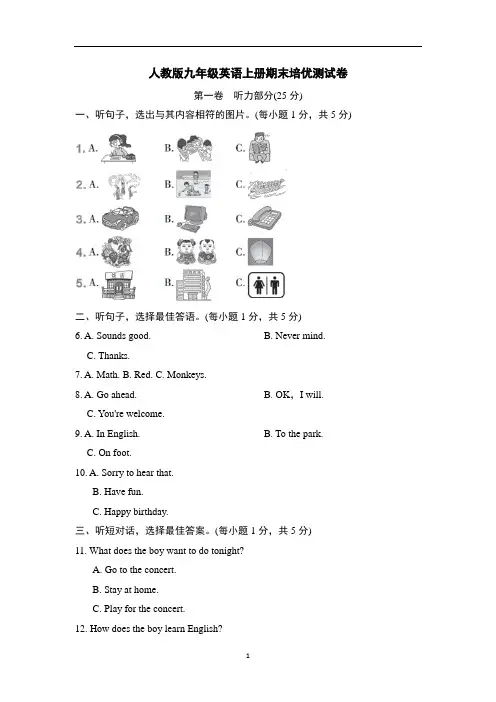
人教版九年级英语上册期末培优测试卷第一卷听力部分(25分)一、听句子,选出与其内容相符的图片。
(每小题1分,共5分)二、听句子,选择最佳答语。
(每小题1分,共5分)6. A. Sounds good. B. Never mind.C. Thanks.7. A. Math. B. Red. C. Monkeys.8. A. Go ahead. B. OK,I will.C. You're welcome.9. A. In English. B. To the park.C. On foot.10. A. Sorry to hear that.B. Have fun.C. Happy birthday.三、听短对话,选择最佳答案。
(每小题1分,共5分)11. What does the boy want to do tonight?A. Go to the concert.B. Stay at home.C. Play for the concert.12. How does the boy learn English?A. By practicing pronunciation.B. By reading aloud.C. By listening to tapes.13. When is the best time to visit Hong Kong?A. May.B. June.C. July.14. What time did the bookstore close yesterday?A. At 7: 00 p. m.B. At 5: 00 p. m.C. At 3: 00 p. m.15. Where did Mary go last week?A. To a sports festival.B. To an art festival.C. To a culture festival.四、听长对话,选择最佳答案。
九年级英语学科培优补差工作计划九年级是初中三年的关键阶段,面临着升学压力,而学生的英语成绩存在严重的两极分化问题,只有做好培优补差工作,才能让优生更优,差生不差。
以下是我们九年级英语教研组制订的培优补差工作计划:一、目标设定(一)培优目标让优生“吃得饱”,提高优学的语言综合运用能力,尤其是口语水平和写作能力,为他们参加各类英语竞赛和进一步深入学习打下坚实基础。
(二)补差目标让后进生吃下去“消化得了”,帮助英语基础薄弱的学生迎头赶上,重点帮助他们巩固基础知识,激发学习兴趣,确保他们能够达到课程标准要求。
二、学生分析(一)培优对象英语成绩稳定在班级前10%的学生,具有较好的英语学习习惯和较强的自主学习能力。
(二)补差对象英语成绩在班级后30%的学生,存在学习障碍,需要额外的关注和辅导。
三、教学策略(一)分层教学根据学生的英语水平,将学生分为不同层次,实施有针对性的教学计划。
例如,试卷讲评课中,差生板书基础题答案,中等生订正并攻克中等题,优生当小老师讲解难题;课堂练习及课后作业分成三个层级:第一层:“必做题”—基础题,第二层:“选做题”—中等题,第三层:“思考题”—拓展题,满足不同层次学生的需要。
(二)个性化辅导为补差学生制定个性化的学习计划,包括课后辅导、额外练习和定期评估。
四、培优措施(一)扩展阅读推荐适合学生水平的原版英语读物,扩大阅读量,增加学生的词汇量,拓宽学生知识面。
(二)口语训练组织英语角、辩论赛、英语演讲等活动,提高学生的口语交际能力和整体素质。
(三)写作提升通过写作工作坊和定期的作文练习,提升学生的写作技巧。
五、补差措施(一)基础知识巩固重点复习和巩固英语语法、词汇等基础知识。
(二)学习兴趣培养通过游戏、歌曲、动画、演情景剧、拍英语短视频等有趣的教学方法,努力让每个人都参与到课堂中来,提高学生对英语学习的兴趣。
(三)同伴互助合理分组,互帮互助,优中培优,优中带差,共同进步。
六、时间安排(一)培优时间每周安排一次额外的英语提升课程,时间为1小时。
2024年九年级英语培优补差计划九年级是初中三年的关键时刻,面临着毕业的升学压力,对学生来说,取得好成绩就是最重要的事情。
结合上期英语教学工作的得失,以下是对本期培优补差方面的工作所做的规划:一、指导思想:提高优生的自主和自觉学习能力,进一步巩固并提高中等生的学习成绩,逐步提高学习成绩,并培养较好的学习习惯,形成英语基本能力。
培优计划要落到实处,发掘并培养一批英语尖子,挖掘他们的潜能,从培养英语基本能力入手,训练良好学习习惯,从而形成较扎实的基础和阅读能力,提高他们的英语成绩。
二、制定目标:在这个学期的培优辅差活动中,培优转差对象按照计划提高听,读、说、写的综合英语能力,成绩将会在原有基础上有一定的提高,特别是英语考试这一基本的能力。
英语成绩的提高能够为即将面临中考考验的学生的总成绩做出贡献。
三、学生情况分析:本学期我所任教的两个班的学生共有____人,从上学期的学习情况及知识技能掌握情况看,大部分学生学习积极性高,学习目的明确,上课认真,作业能按时按量完成,且质量较好,但也有少部分学生,基础知识薄弱,学习态度欠端正,书写较潦草,作业有时不能及时完成,因此本学期除在教学过程中要注重学生的个体差异外,我准备在提高学生学习兴趣上下功夫,通过培优转差的方式使优秀学生得到更好的发展,潜能生得到较大进步。
四、定内容:这学期的培优转差教学主要是为了提高优生的英语成绩,因此,我拟计划按照中考试题的题型划分,对学生进行专项训练,重点讲解单选题,用所给词的适当形式填空,补全对话,作文,听力这几方面的内容,在课堂上精讲,夯实学生的基础知识,并布置一定的练习,有针对性地训练,提高学生的做题能力。
五、主要措施1.认真备好每一次培优转差教案,努力做好学习过程的知识性和实效性相结合。
2.制定切实可行的培优转差计划,严格按计划实施,注重过程,注重效率,注重效果。
进行集体培优。
把优生集中在一起定时定点进行。
让优生有动力同时也有竞争的感觉。
九年级英语培优方案
1. 导言
本文档旨在制定九年级英语培优方案,帮助学生在英语研究中
取得更好的成绩。
方案内容包括研究目标、研究方法和评估方式等。
2. 研究目标
- 提高学生的英语听、说、读、写能力。
- 培养学生的语言交际能力和文化素养。
- 增强学生对英语研究的兴趣和自信心。
3. 研究方法
3.1 课堂研究
- 学生应积极参与课堂活动,与教师和同学互动交流。
- 鼓励学生提问和回答问题,加强语言表达能力。
- 培养学生独立思考和解决问题的能力。
3.2 自主研究
- 学生应每天抽出一定时间进行英语自主研究。
- 阅读英语书籍、报纸、杂志等,提高阅读理解能力。
- 多听英语广播、音乐和影视剧,提高听力理解能力。
- 动手写作,提高写作能力。
- 制定研究计划,合理安排研究时间。
3.3 合作研究
- 学生可以组成研究小组,相互研究和交流。
- 分享研究方法和心得体会。
- 进行角色扮演、演讲和讨论等活动,提高口语表达能力。
4. 评估方式
- 定期进行书面、口头考试,评估学生的语言能力。
- 作业批改和提供反馈,帮助学生发现和纠正错误。
- 定期举办英语演讲和写作比赛,提高学生的表达能力。
- 组织听力、口语和阅读等技能竞赛,激发学生的研究热情。
5. 总结
通过本方案的实施,我们相信学生们在英语学习中将取得显著的进步。
学生们将不仅仅掌握英语的基本技能,更能够灵活运用英语进行交流,并增强对英语学习的兴趣和自信心。
九年级英语Unit 9培优训练一、短文还原。
Whenever you are invited to a Western family for dinner, to know some knowledge of Western manners is very important. 1.First, be on time. To be a polite guest, be sure to get there on time. Being late as well as being too early is impolite. If you can't get there on time, make a call as early as possible.2.People in different countries have different ways of greeting each other. In Britain and the United States, people are supposed to shake hands when they meet for the first time. For friends, they may choose a hug. In France, greeting with a kiss is very common.Third, mind table manners. When having dinner, you should behave properly. For example, putting your spoon in the soup bowl is considered impolite. 3.Be careful not to make much noise when cutting things with your knife.Fourth, keep a proper talking distance(距离). Generally, one meter between each other is perfect in Britain. 4.People will feel uncomfortable when they are too close to each other or too far from each other.5.Some flowers or a bottle of wine is enough. If there are children, some chocolate will be nice.As the saying goes, "When in Rome, do as the Romans do." It's just the key to being a polite guest abroad.根据材料内容,从下面五个选项中选出能填入文中空缺处的最佳选项,使文章意思通顺、内容完整。
九年级英语培优补差计划范本一、指导计划提高优生的自主和自觉学习能力,进一步巩固并提高中等生的学习成绩,帮助差生取得适当进步,让差生在教师的辅导和优生的帮助下,逐步提高学习成绩,并培养较好的学习习惯,形成英语基本能力。
培优计划要落到实处,发掘并培养一批英语尖子,挖掘他们的潜能,从培养英语能力入手,训练良好学习习惯,从而形成较扎实的基础和阅读写话能力,并能协助老师进行辅差活动,提高整个班级的英语素养和英语成绩。
二、制定目标:在这个学期的培优辅差活动中,培优对象能按照计划提高读、说、写的综合能力,成绩稳定在____分左右,并协助老师实施辅差工作,帮助差生取得进步。
辅差对象能按照老师的要求做好,成绩有一定的提高。
特别是英语考试这一基本的能力。
三、定内容:培优主要是继续提高学生的阅读能力和理解能力。
介绍或推荐适量课外阅读,让优生扩大阅读面,摄取更多课外知识,多给他们一定的指导,以期在写作中能灵活运用,提高写话水平,定时安排一定难度的练习任务要求他们完成,全面提高运用语言的能力。
辅差的内容是教会学生敢于读,安排比较基础的内容让他们掌握。
训练差生,让差生尝试说、敢于说、进而争取善于说。
四、主要措施:l.课外辅导,利用课余时间。
2.采用一优生带一差生的一帮一行动。
3.请优生介绍学习经验,差生加以学习。
4.课堂上创造机会,用优生学习思维、方法来影响差生。
5.对差生实施多做多练措施。
优生适当增加题目难度,并安排课外作品阅读,不断提高做题和写作能力。
6.采用激励机制,对差生的每一点进步都给予肯定,并鼓励其继续进取,在优生中树立榜样,给机会表现,调动他们的学习积极性和成功感。
7.充分了解差生现行学习方法,给予正确引导,朝正确方向发展,保证差生改善目前学习差的状况,提高学习成绩。
8.重视中等成绩学生,保持其成绩稳定和提高。
9.必要时与家长联系,协助解决差生的学习问题。
九年级英语培优补差计划范本(二)一、指导思想为了实施素质教育、面向全体学生,就必须做好特长生的培养和后进生的转化工作。
初中英语培优补差工作总结6篇(经典版)编制人:__________________审核人:__________________审批人:__________________编制单位:__________________编制时间:____年____月____日序言下载提示:该文档是本店铺精心编制而成的,希望大家下载后,能够帮助大家解决实际问题。
文档下载后可定制修改,请根据实际需要进行调整和使用,谢谢!并且,本店铺为大家提供各种类型的经典范文,如工作报告、工作计划、心得体会、讲话致辞、条据文书、合同协议、策划方案、教学资料、作文大全、其他范文等等,想了解不同范文格式和写法,敬请关注!Download tips: This document is carefully compiled by this editor. I hope that after you download it, it can help you solve practical problems. The document can be customized and modified after downloading, please adjust and use it according to actual needs, thank you!Moreover, our store provides various types of classic sample essays, such as work reports, work plans, insights, speeches, written documents, contract agreements, planning plans, teaching materials, complete essays, and other sample essays. If you want to learn about different sample formats and writing methods, please pay attention!初中英语培优补差工作总结6篇工作总结是对工作中困难和挑战所带来的机遇和创新的深入思考和总结,写工作总结可以让我们在工作中及时发现自己的短板和需要改进的方面,以下是本店铺精心为您推荐的初中英语培优补差工作总结6篇,供大家参考。
一、单项选择。
( )1.---Why not ask your father to draw_____ map for you?---A good idea, then I can get to _____ Sunshine Town.A.a, theB./,anC.the,aD.a,/( )2. ---Jim, it’s cold today. Put on your coat.--- Mum, don’t ____ about me. I can look after myself well.A.talkB.tellC.worryD.think( )3. It is said that the Lake Tunnel ____ in 2015.A.was completedB. is completedC.has been completedD.will be completed( )4. ---How is your grandma?--- She is fine. She used to ____ TV at home after supper. But now she is used to ____ out for a walk.A.watch,goingB.watching,goC.watch,goD.watching,going( )5. ---I didn’t know the importance of health _____ I lost it.--- It is a pity. Take care of yourself,dear.A.beacuseB.afterC.whenD.until( )6.---High school _____ covers a lot,including Chinese, English and so on.---Oh, I will wok hard.A.abilityrmationC.practiceD.course( )7.---A number of visitors______ Yangzhou many times because it’s beautiful.---That’s right.A.have been toB.has been toC.have gone toD.has gone to( )8.---I offered Jam a helping hand. However, he ____ it.---Maybe he can do it alone.A.recieverdB.returnedC.repeatedD.refused( )9. ---Excuse me,will the plane for Beijing _____ within an hour?---I’m not sure. You can go to the Information Desk for help.A.get offB.take offC.turn offD.show off( )10.---Do you think “Daddy, where are you going” the best programme in 2013?---Well,____ I agree with you.A.by the wayB.in some waysC.on the wayD.under the way( )11.---They didn’t know ______ to do with the problem.---They could ask their teacher for help.A.howB.whatC.whichD.where( )12. ---Pardon? I didn’t hear you just now.---I asked_____.A.that Mihelle Obama came to China in MarchB.how long did Michelle Obama stay in ChinaC.when did Michelle Obama visit ChengduD.who Michelle Obama came to China with( )13.---Daniel was ______ a bad mood and couldn’t find anybody to_____.--- Sorry to hear that.A.on, tell aboutB.on,talk withC. in,talk toD.in, tell with( )14.---What do you think of He Garden in Yangzhou?---It is worth___. I ____there a week ago.A.to visit,whenB.visiting,wentC.to visit,goD.visiting,go( )15.---Thank you for your gift, the colour of the scarf is my favourite.---_____.A.No, don’t thank meB. I am glad you like itC.Please don’t say soD. No, it is not good二、完形填空。
( )16. A.anything B.something C.nothing D.everything( )17. A. preparing B. getting C. joining D. leaving( )18. A. sat B. gathered C. came D. got( )19. A. hardly B. carefully C. easily D. quietly( )20. A. important B. interested C. impatient D. impossible( )21. A. calm B. warm C. hot D. fit( )22. A. showed B. presented C. offered D. gave( )23. A. rose B. held C. put D. raised( )24. A. but B. otherwise C. however D. instead( )25. A. finish B. compete C. start D. begin( )26. A. between B. among C. without D. near( )27. A. in B. by C. on D. under( )28. A. but B. so C. and D. because( )29. A. past B. crossed C. walked D. went( )30. A. won B. become C. run D. beaten三、阅读理解。
One day, our teacher said that he had an exercise for us to try. We were to stand still, facing away from our classmates, and fall backward, relying (依赖) on another student to catch us. Most of us were uncomfortable with this. We couldn’t fall back for more than a few inchesbefore stopping ourselves.Finally, Judy stood out. She is a thin, quiet, dark-haired girl who always wears big, white fisherman sweaters. Judy crossed her arms over her chest, closed her eyes, leaned back, and did not flinch (退缩). She looked like one of those Lipton tea advertisements where the model jumps into the pool.For a moment, I was sure she was going to fall on the floor. At the last moment, her partner grabbed her head and shoulders and pulled her up immediately.“Wow!” several students cheered. Some clapped their hands. Our teacher finally smiled. “You see,” he said to the girl. “You closed your eyes. That was the difference. Sometimes you cannot believe what you see. You have to believe what you feel. And if you are ever going to have other person trust you, you must feel that you can trust them too –even when you’re in the dark, even when you’re falling.”( )31. In the exercise, the students were asked to _____.A. stand stillB. face their classmatesC. stop other students from fallingD. fall backward onto their classmates( )32. What can we learn about Judy from paragraph 2?A. She was too scared to do the exercise.B. She was so thin that it was easy to catch her.C. She jumped into the swimming pool.D. She was very brave and set a good example.( )33. How did the students feel when Judy finished the exercise?A. NervousB. ExcitedC. CuriousD. Interested( )34. Which is the best title for the passage?A. Never believe what you seeB. Ask for help in the darkC. Trust friends when fallingD. To feel is better than to see四、词汇运用1. The young woman loves peace and never _____ (argue) with others.2. If you don’t go boating tomorrow, I won’t,______ (也).3. It’s a pity that two young _____(消防员) lost their lives in the fire.4. “Why didn’t you tell me earlier?” The boss shouted ______(生气的).5. I _____ (更喜欢) sweet snacks and vegetables before.6. It’s _____ (report) that there was an earthquake here.7. He was running so fast that he couldn’t stop _____ (he).8. Listening to the music or talking to your friends can make you forget the ____(happy).9. He kept _____ (look) at the watch to see how much time was left.10. May I introduce Peter, an old friend of _____(I) to you.五、任务型阅读。